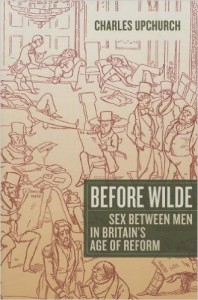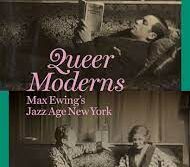 Before Wilde: Sex between Men in Britain’s Age of Reform
Before Wilde: Sex between Men in Britain’s Age of Reform
by Charles Upchurch
University of California Press. 276 pages, $45.
THIS INSIGHTFUL BOOK is an illuminating study of London in the early to mid-19th century. Charles Upchurch, assistant professor of history at Florida State University, examines the court documents and newspaper accounts of criminal cases of men accused of homosexual acts. The evidence demonstrates, in his words, that “there was no single, unified understanding of sex between men” during this time; rather, people’s reactions to these cases, especially those of the families of the men accused, differed depending on their class standing. While such cases were generally condemned and the suspects excoriated by the vast majority of people, those in the upper echelons of society, having been exposed to positive role models of homosexual conduct in ancient works, tended to be somewhat sympathetic toward associates who were accused of such crimes. Indeed, men from the upper class could request that their case be heard before special juries, drawn only from men of similar background.
Individuals from the working class also tended to be more tolerant of their men who were accused of sex with other men (or as it was called in the language of the day, “unnatural assault”). Particularly if the other man in the case was from the upper classes, they would assume the act was done for financial reward, which was considered an acceptable option. In general, Upchurch argues, people from all classes were usually eager to keep the authorities out of their business, even in cases of unwanted sexual contact between men. Only when they had exhausted all other options did they turn to the law, hoping to resolve the situation themselves. Even in activities not involving homosexuality, the majority of Londoners resented the presence of the newly formed Metropolitan Police. Witness the mob attack on a police sergeant after he came across a local married man with a prostitute in his stable: although the sergeant did not charge the man for his tryst, his neighbors were furious at this intrusion of the law into their private affairs. The police regularly engaged in undercover sting operations against homosexuals, infiltrating taverns and so-called “molly houses,” where such men were known to congregate, until public reaction at such secretive, underhanded tactics caused them to stop. After that, constables usually picked up men engaged in homosexual activities around public places, such as parks, urinals, or even outside shop windows. There were many such arrests throughout the time period Upchurch covers. Upchurch also examines the newspaper coverage of cases involving “unnatural assault,” showing that papers writing for different audiences tended to emphasize different things. For example, papers read by the higher social strata tended to run stories “highlighting the defeat of extortionists who preyed on the upper class,” while the Times covered cases of middle- and upper-class men as exploiting men from the lower classes, in which the final judgment often rested on one man’s word against another man’s. From all the extensive coverage of these cases in the newspapers, Londoners were well aware that sex between men occurred in their city; most male readers knew, for example, that Hyde Park was a favorite cruising ground best avoided at night (or frequented, if one so chose). Before Wilde is full of fascinating stories from court cases, showing the various situations that could arise from same-sex pursuits and the many different ways that such cases might end. The book also contains many interesting details, such as the fact that, contrary to popular opinion, “the public schools were less frequently associated with homosexual acts” than were the small day and boarding schools run by a single master. The heads of those schools are the ones who usually ended up before the courts. Charles Green is a writer based in Annapolis, Maryland.





